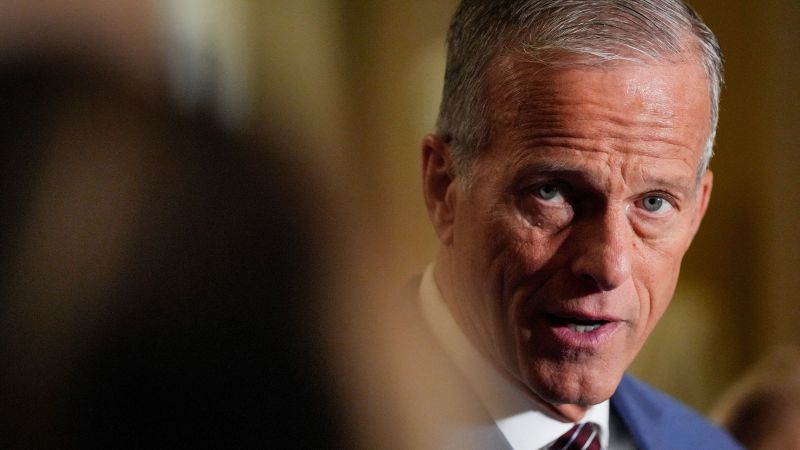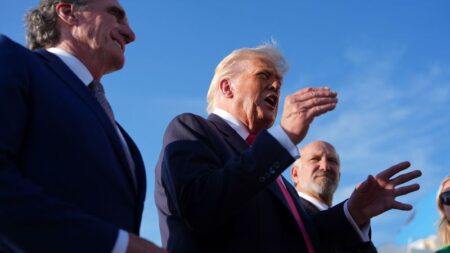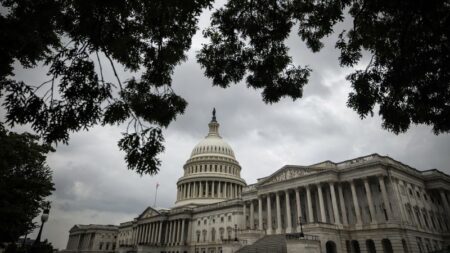On a tumultuous Tuesday, the Senate took a vital step closer to voting on a significant GOP initiative aimed at solidifying cuts to the Department of Government Efficiency’s budget. This movement comes as Congress faces an impending deadline to act on a critical priority set forth by the White House. The culmination of these efforts is pivotal, as they attempt to codify spending reductions that have been favored by a particular faction within the political landscape.
The proposed legislative package intends to reclaim billions of dollars that Congress has previously allocated for various programs, including foreign aid and public broadcasting. This must be approved by both the Senate and the House by the looming Friday deadline, leveraging an obscure presidential budget law designed to bypass the usual filibuster challenges. A breakthrough came when Senate Republicans appeared to finally resolve disagreements centered around a global health initiative as well as funding for rural radio access, paving a potentially smoother path moving forward.
During the procedural vote, however, dissent came from three prominent GOP senators, namely Susan Collins from Maine, former Senate GOP leader Mitch McConnell, and Lisa Murkowski of Alaska. The vote concluded with a narrow 51–50 outcome, with Vice President JD Vance stepping in to provide the decisive vote that allowed the advancement of the package.
On Wednesday, the Senate is set to regroup for further debate on the bill, leading into an extensive voting session encompassing proposed amendments. The timing for this critical final vote remains uncertain, which adds to the suspense of this legislative endeavor. Amidst these procedural developments, Senate Majority Leader John Thune confirmed earlier in the day that a controversial $400 million budget cut affecting the President’s Emergency Plan for AIDS Relief (PEPFAR) was no longer included in the package, scaling back the anticipated cuts to about $9 billion. This change was well-received by some GOP holdouts who had raised concerns about the implications of such a cut.
The White House’s Budget Director, Russ Vought, responded positively to the package following discussions with Republican senators, asserting the package’s overall robustness. He indicated an understanding of the Senate’s autonomy in reaching a legislative agreement, emphasizing the cooperation that has led to a seemingly favorable voting outcome.
In a separate but related development, Senator Mike Rounds from South Dakota announced his support for the measure after striking a deal that would ensure continued funding for rural radio stations in his state. Rounds expressed a commitment to maintaining broadcasting services crucial for public safety alerts in tribal areas. He highlighted his collaboration with the previous Trump administration to reallocate funds earmarked for grants to ensure these essential services would not experience interruption, showcasing the negotiation efforts that have taken place.
Despite this support, the potential rise of dissent among other Republican senators remains a concern as the final vote approaches. Collins and Murkowski articulated their opposition based on the lack of specific information regarding the cuts’ ramifications on global health initiatives and their broader desire to protect public broadcasting funding.
Murkowski voiced strong concerns regarding the ramifications of the rescission package, suggesting it undermines Congressional authority. She emphasized the role of lawmakers in formulating legislation rather than acting merely upon directives from the White House.
The anticipated amendments during the forthcoming voting session must align with the bill’s core themes, which narrows the types of amendments permissible compared to typical vote-a-rama sessions. Nevertheless, this will provide opportunities for Republicans to adjust the bill while also giving Democrats a platform to compel their Republican counterparts to cast votes on contentious issues.
In the context of these developments, it’s anticipated that any alterations made to the legislative package would necessitate a return to the House for final approval, indicating that the Senate GOP is again prioritizing a Trump-backed initiative. House Speaker Mike Johnson underscored the necessity of submitting the proposal back to the House unchanged, considering the delicate balance of majority held by House Republicans.
Johnson expressed his commitment to processing any bill the Senate forwards without delay, fostering an atmosphere of urgency as the clock ticks down toward the legislative deadline. Observers will be closely watching how these dynamics unravel as the Senate engages in the critical final stages of deliberation and voting on this pivotal legislation.











